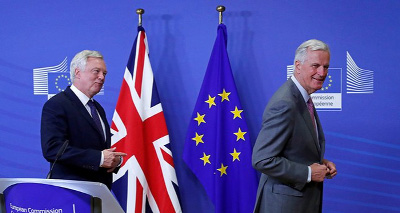
Xinhua, Brussels :
Britain and the European Union (EU) launched a new round of Brexit negotiations on Monday as Brexit Secretary David Davis meets with EU’s chief negotiator Michel Barnier for four days of talks to settle “divorce” terms. About a month after their first meeting, the two intend to push forward with a detailed plan that could minimize economic and social damage to both Britain and the EU after Brexit.
“We made a good start last month, and this week we’ll be getting into the real substance,” Davis was quoted by Reuters as saying ahead of the meeting.
Negotiators will focus on key issues concerning Britain’s withdrawal, including citizens’ rights, Britain’s exit bill and the border in Northern Ireland. The EU had demanded that Britain pay some 60 billion euros (70 billion U.S. dollars) as exit fee.
Negotiation on the exit bill might be especially tough, following British Foreign Minister Boris Johnson’s remark last week that the EU could “go whistle” over its “extortionate” bill demand.
The British side had urged over the past months an immediate start of trade talks, but Barnier had insisted that key issues of Brexit must be dealt with before trade talks begin.
On Thursday, the British government introduced a draft law that would formally end Britain’s membership in the European Union, as preparation for eventually breaking away from the EU and gaining back legislation power of parliaments.
On Saturday, former British Prime Minister Tony Blair said, however, that EU leaders would be willing to change their rules on immigration and free movement to enable Britain to stay in the 28-nation trading and economic bloc.
In March, Prime Minister Theresa May had set a two-year timetable for leaving the EU, and has said the process can’t be reversed.
Britain and the European Union (EU) launched a new round of Brexit negotiations on Monday as Brexit Secretary David Davis meets with EU’s chief negotiator Michel Barnier for four days of talks to settle “divorce” terms. About a month after their first meeting, the two intend to push forward with a detailed plan that could minimize economic and social damage to both Britain and the EU after Brexit.
“We made a good start last month, and this week we’ll be getting into the real substance,” Davis was quoted by Reuters as saying ahead of the meeting.
Negotiators will focus on key issues concerning Britain’s withdrawal, including citizens’ rights, Britain’s exit bill and the border in Northern Ireland. The EU had demanded that Britain pay some 60 billion euros (70 billion U.S. dollars) as exit fee.
Negotiation on the exit bill might be especially tough, following British Foreign Minister Boris Johnson’s remark last week that the EU could “go whistle” over its “extortionate” bill demand.
The British side had urged over the past months an immediate start of trade talks, but Barnier had insisted that key issues of Brexit must be dealt with before trade talks begin.
On Thursday, the British government introduced a draft law that would formally end Britain’s membership in the European Union, as preparation for eventually breaking away from the EU and gaining back legislation power of parliaments.
On Saturday, former British Prime Minister Tony Blair said, however, that EU leaders would be willing to change their rules on immigration and free movement to enable Britain to stay in the 28-nation trading and economic bloc.
In March, Prime Minister Theresa May had set a two-year timetable for leaving the EU, and has said the process can’t be reversed.

